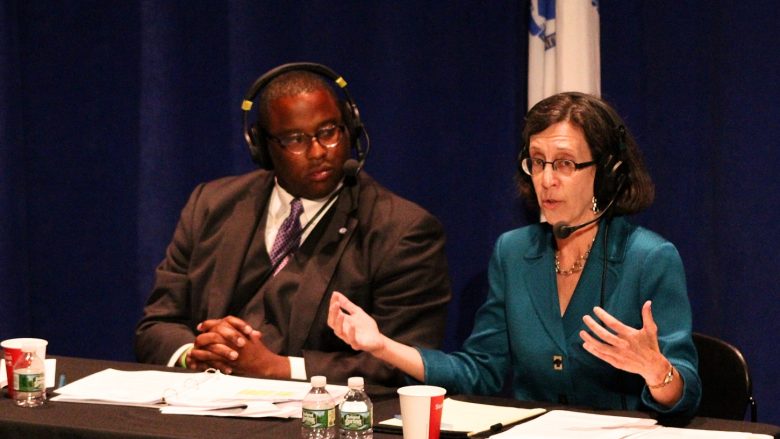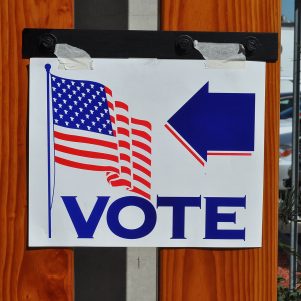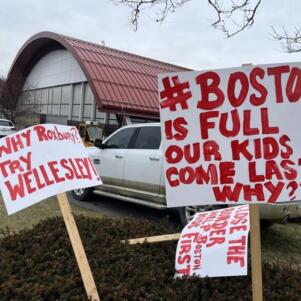Charter school cap debate a heated, Boston-centric affair
By Evan Lips | September 13, 2016, 19:26 EDT
 (Evan Lips — New Boston Post)
(Evan Lips — New Boston Post) BOSTON — City Councilor Tito Jackson and former Democratic state Rep. Marty Walz engaged in what was at times a heated debate Tuesday over Question 2, which will ask voters state-wide this November whether to lift the cap on public charter schools.
Although the impact of the November vote will be felt across the state, the debate held on the campus of the University of Massachusetts Boston was noticeably Boston-centric. When Jackson argued that the ballot question represents an unfunded mandate that the city will be struggle to afford, Walz countered that Boston Public Schools currently “spend more per pupil than any of the 100 largest school districts in America.”
The most recent U.S. Census Bureau statistics pegged Boston’s spending per pupil at $20,500 annually, ranking it number one out of America’s 100 largest school districts.
“I think the real question is — ‘how is Boston spending its resources?’” Walz said at one point, eliciting groans from charter school opponents seated in the audience. “State funding is not just to go to Boston Public Schools to further fund its bureaucracy — it’s about educating kids no matter where they want to go to school.”
Jackson, meanwhile, pointed to warnings issued by the bond rating giant Moody’s over the years claiming that increasing the number of charter schools can be financially risky for cities.
“With this unfunded ballot question, we could be at a place where the city of Boston loses its AA bond rating, because when we run out of our state funding, what could actually happen is we could be in a situation where the city of Boston sends general fund money over to charter schools,” Jackson noted.
Jackson also claimed that Boston’s public school district “has a longer waiting list” than the wait lists the city’s charter school advocates frequently reference, prompting one attendee seated in the back of UMass-Boston’s McCormack Theater to shout, “you’re lying!”
Jackson did add at one point that he does not oppose charter schools in theory.
“We’ve learned a lot from charter schools, like extended school days and autonomy at the school site level where a principal can actually make some choices in terms of hiring,” he said. “My question back to those charters is — what are you learning from Boston Public Schools?”
Several audience members could be heard muttering, “no,” as Jackson ticked off items such whether the charter schools are “learning how to take care of special education students.”
Walz had a response ready when asked how charter schools can be “locally controlled” and “held accountable.”
“The point about local control is well-taken — it is local control that got us into the situation that we’re in,” she said. “The reason charter schools exist is because local school districts have wholly failed to educate far too many children in this state.”
Walz also claimed that charter schools are held more accountable in Massachusetts than public schools, a comment that elicited another round of groans from the side opposed to the ballot question.
“Generation after generation of students in Boston for example have attended failing schools and those schools have not been shut down,” Walz said.
“Spin away,” one ballot question opponent seated in the audience could be heard saying in response.
Walz later took on critics who have pointed out that millions of out-of-state dollars have poured into the campaign supporting the ballot question. According to recently submitted state campaign finance reports, Great Schools Massachusetts, the campaigning arm behind the ballot questions, has received nearly $8.2 million in 2016, with billionaire and former New York City Mayor Michael Bloomberg listed as a $240,000 donor.
Save Our Public Schools, the chief opposition organizer, has taken in almost $6.8 million since March.
“If we want to get into sources of money, the vote no campaign is also being funded by out-of-state money as well, so I’m not sure this is where the debate should be happening,” Walz said. “The debate should really be about who is doing the best job educating children as opposed to the adult concerns of who is donating to the campaigns.”
“Corporate money versus workers’ organizations,” one audience member countered.
Challenged by the moderators as to why she was apparently downplaying the role that “dark money” is playing in the campaign to lift the cap, Walz countered by claiming that “one of the things that often gets left behind in debates are the children.”
November’s ballot question specifically asks voters if they will support opening up to 12 new charter schools annually. Wednesday’s debate, moderated by WBUR’s Meghna Chakrabarti and the Boston Globe’s David Scharfenburg, is the first of four slated to be held this month.
As for the chances voters will pass the initiative, results of a WBUR poll released Tuesday showed that just 41 percent of voters support listing the cap compared to 48 percent who say they are opposed.
The remaining three debates will all focus on the individual ballot questions, including a question dealing with improving the treatment of farm animals via a ban on smaller cages, a question on whether to grant a license for an additional slot machine parlor in the state and a question on whether to legalize the recreational use of marijuana.











